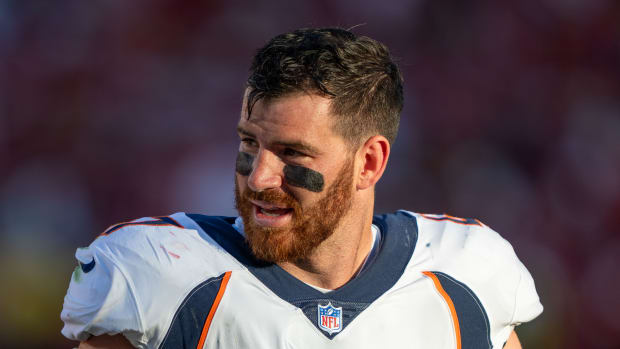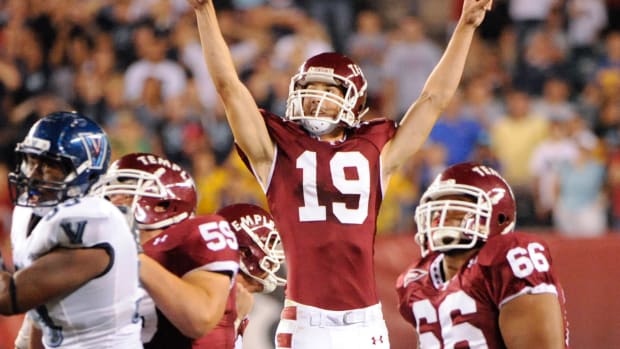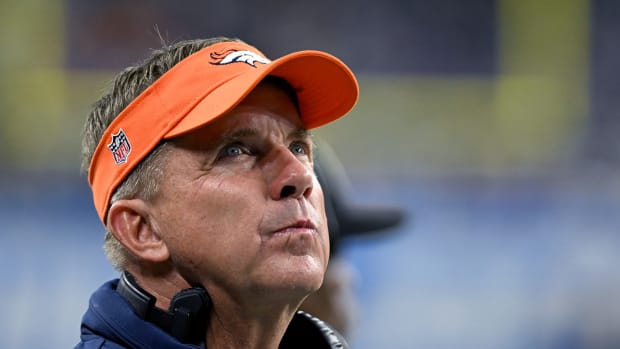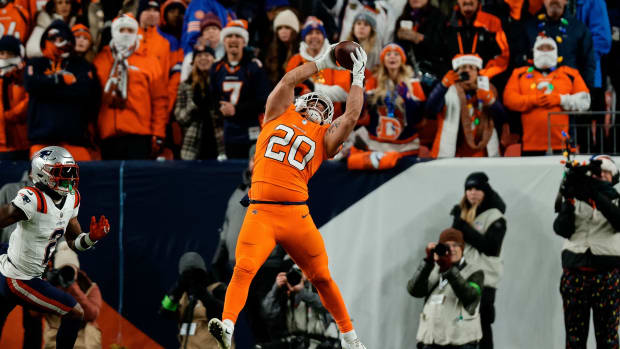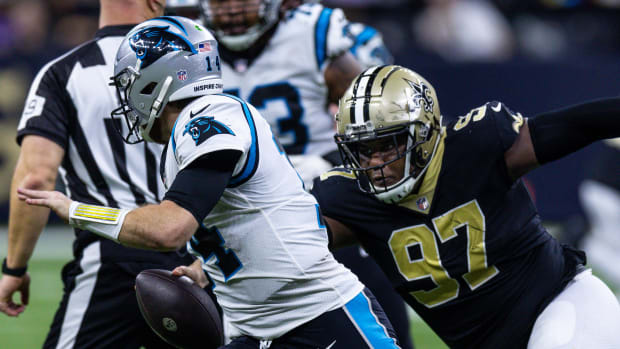Data Suggests Broncos Shouldn't Scrimp on the Backup QB Position Behind Drew Lock
The Denver Broncos have a need at the quarterback position. No, I'm not talking about replacing incumbent starting quarterback Drew Lock. Rather, the Broncos have a massive hole at backup quarterback heading into the 2020 free agency period.
This is a position that requires serious attention. Let me explain why the Broncos can't skimp on the position.
Current Backup Options at QB Leave One Wanting
Currently, the Broncos have Brett Rypien as the only other QB under contract. After getting little-to-no playing time as an undrafted rookie QB last preseason, Rypien is as unknown of a quantity as can be in the NFL landscape.
While Rypien had some success at Boise State, his overall tools in the tool chest had him fall outside of the drafted players in the previous draft class. Rypien is small, a limited athlete, and has less-than-desirable arm strength to push the ball outside the numbers and down the field.
He has reportedly developed a friendship with Lock, which Rypien can help his fellow 2019 rookie QB in some of the minutiae in regards to the mental side of the game, but having to go with Rypien as a starter for any extended period of time in place of an injured Lock would likely lead to numbers racking up in the loss column.
Rypien has a chance to be a third-string QB and/or a practice squad member once again next season, but going into 2020 with him as the primary backup very easily could be the difference between a playoff berth or missing the big dance for the fifth season in a row — if Rypien ever has to replace Lock and start for one or two games.
The Broncos do not currently have QB Brandon Allen under contract. He is a restricted free agent and the team has made no move to tender as of yet. While Allen came into last season to replace an injured Joe Flacco while the team waited on Lock's sprained thumb to heal and takeover, the results were spotty at best.
Yes, Allen helped the Broncos earn a ‘W’ at home against the Cleveland Browns in Week 9 in his first-ever NFL start, but that was very quickly found to be unsustainable. Furthermore, while Allen ‘won’ that game (teams win games, not QBs, but that is another topic entirely), his output was largely thanks to explosive plays from the Broncos’ two best passing weapons in Courtland Sutton and Noah Fant, but also thanks to the flub that was the Freddie Kitchens era in Cleveland.
Skip ahead two weeks and once again, Allen was throwing up prayers that Sutton came down with against the Minnesota Vikings. At least, early on in that game.
Sutton is an emerging star and how he produced no matter the QB should have Broncos Country excited. Unfortunately for Denver and Allen, with each passing snap, the QB looked less and less serviceable as a starter, let alone as a backup.
The icing on the cake was the absolute abomination that was the Buffalo Bills game in Week 12. The weather conditions were horrid in Upstate New York and only amplified the disparity in talent and tools between the Broncos' Allen and the Bills’ starting quarterback Josh Allen.
The more Brandon was exposed to snaps and playing time, the worse he became. The Broncos have yet to make a decision on if to retain Allen or not, but if he is leaned on for anything beyond competing in camp for the third QB spot, the Broncos again will likely kiss playoff contention goodbye even if Lock misses just one or two games.
With the Broncos set to have $57.5 million in cap space, thanks in large part to their starting QB making pennies on the dollar in comparison to other starters around the league, Denver would be wise to use some of that cap space to add a better quarterback to backup Lock for 2020.
While the offseason is brimming with hope and optimism, the reality is, teams need to cover their bases and prepare for injury as much as they need to focus on improving the starters on the roster. This applies for the backup QB as much as any other position.
Data Suggests the Backup QB Will See Meaningful Snaps
In 2019, an eye-opening 52 different quarterbacks took at least 100 snaps at the QB position. Due to a varying number of reasons such as struggling passers being replaced to injury, the number of different QB who took reps on the football field in 2019 should be a massive indicator just how important having a backup worthy of trust matters.
Of course, if Lock has a season-ending injury *knocks on wood* then the drop off from starter to whomever the backup likely matters little. However, most injuries are minor to moderate that could cause a team to roll with a backup QB for 2-4 starts, which easily could make or break that team’s ability to make the playoffs.
Backup QBs Played Gigantic Role in Recent Super Bowl Winners
Some recent examples of backup QBs making a massive difference in regards to the outcome of a team’s season come from three of the most recent Super Bowl championship teams: the 2019 Kansas City Chiefs, the 2017 Philadelphia Eagles, and the 2015 Denver Broncos. All three teams wound up hoisting the Lombardi Trophy and without a solid contribution from the backup QB, and investment therein, very likely never end up champions.
In 2019, Patrick Mahomes suffered a knee injury against the Broncos. In stepped backup QB Matt Moore, who guided the Chiefs to an easy 30-6 victory in Denver. Moore would start the next two games in place of Mahomes and help guide the Chiefs to a 1-1 record.
If Kansas City had a less competent backup in place, perhaps they lose both those games. One more loss may seem inconsequential but in reality one loss would have meant the Chiefs would have fallen from the No. 2 to the 3-seed and a butterfly effect could have taken place from there.
The 2017 Eagles are likely the most known recent lesson in why rostering a capable backup matters. With likely MVP front-runner Carson Wentz going down with a tear on his ACL and LCL, backup Nick Foles stepped in to close out Weeks 15, 16, and 17 of the regular season.
Foles would not only help the Eagles earn the No. 1 overall seed in the NFC, but led his team to three victories in the playoffs over the Atlanta Falcons, Minnesota Vikings, and New England Patriots in the Super Bowl. Eagles GM Howie Roseman has been emphatic in how much he prioritizes investing in a quality backup QB and the payoff for his philosophy was the Eagles' first Super Bowl championship.
What feels like decades ago, the Broncos themselves should have a fair amount of gratitude towards rostering an adept backup QB in the 2015 season. Denver drafted Brock Osweiler in the second round back in 2012 less than two months removed from signing Peyton Manning. Considering Manning's age and neck concerns, Denver wanted a viable backup/developmental option.
Osweiler would not get much run his first three seasons in Denver, but after a deteriorating foot injury and a horrid game at home against the Chiefs, Manning was put on ice for seven weeks and Osweiler was asked to help guide the Broncos through the AFC to earn another playoff berth for the Broncos and the No. 1 seed.
Starting games Weeks 10-17 (and famously being pulled in the Week 17 game vs. the Chargers), Osweiler would help lead the Broncos to a 5-2 record to help secure a playoff spot for the Broncos. Of course, Osweiler was helped by a historic Denver defense in 2015, but earning the No. 1 seed in the AFC was tied directly to Osweiler keeping the ship afloat during Manning’s hiatus.
There very likely is no ‘Broncos 2015 Super Bowl Champions' without Denver having a QB such as Osweiler who could come in, keep the ship afloat, and win football games for the Broncos.
The Options
While the Broncos have the resources both in cap space and draft capital to add a QB, the team would be foolish to spend the massive savings in resources they have thanks to their current cost-controlled QB. Forget about the likes of Dak Prescott, Tom Brady, Philip Rivers, Teddy Bridgewater, Jameis Winston, Derek Carr, Andy Dalton, Ryan Tannehill, and Marcus Mariota.
All those players will be going to teams that are more desperate for starting-caliber QB play in 2020. The Broncos will be rolling with Lock at QB1.
However, there are such quality backup options as Chase Daniel, A.J. McCarron, Matt Moore, Colt McCoy, Mike Glennon, or perhaps (though unlikely) a reunion with either Case Keenum or Trevor Siemian would make far more sense for the Broncos on paper.
The Broncos could even look to invest some of their ample draft capital on the QB position. While they should not likely take one in the top-100 of the draft (although never say never, as QBs are exponentially valuable and it’s never a poor idea to add talent), Denver should be looking to take a flyer on a quarterback day three (or late day two if they love a prospect enough and he falls there).
A philosophy developed by Hall of Fame GM Ron Wolf was to draft a QB every single season, no matter the current roster situation.
“Wolf’s most notable stamp on modern scouting is his view on quarterbacks: While there’s only room for one starter, you can never acquire too many. In Wolf’s world, it is worthwhile to draft a QB every year, no matter the current roster situation. “Looking now from afar, the best quarterback in the game is a sixth-round draft choice [Tom Brady], and that should alert everybody,” Wolf says. “Then you look at what the Cowboys have accomplished with a fourth-round draft choice. I mean, it tells you what you should do. Those who do not know history are doomed to repeat it.”
Consider that in seven out of eight drafts from 1992-99, Wolf drafted a QB, even after Brett Favre was entrenched as the starter.
“I learned very early in this game, if you don’t have a quarterback, you don’t have a chance,” Wolf said. “We were very lucky that we had a unique quarterback that never missed a game. But that didn’t stop me from drafting in late rounds. It’s the premiere position, and you better be able to cover yourself.”
With Lock showing flashes of being a quality starter, the Broncos would be wise to hedge their bet by not only finding a quality backup option, but one to push Lock, who is no sure thing with just five starts on his resume to date. As Wolfe stated, “if you don’t have a quarterback, you don’t have a chance.”
No one knows how the draft will fall, but such projected day-three QBs like Washington State’s Anthony Gordon, Colorado’s Steven Montez, Iowa’s Nate Stanley, Michigan State’s Brian Lewerke, Florida International’s James Morgan, Hawaii’s Cole McDonald could be worth looking at late in the draft. Yes, they are lottery tickets, but such is the case for every single day three draft pick.
Bottom Line
The Broncos seem to have finally found a starter worth rallying around in Lock. However, given the violence of the game, the injury risk any player carries, and the probability that eventually the team will need to rely on the backup QB in some way or another, the Broncos simply cannot be ‘done’ bolstering the position.
Rypien and Allen should inspire confidence in no one. If Lock were to be injured and miss three to four games and Denver didn’t have a viable backup option at QB, that easily could be the difference between making the playoffs or spending a fifth straight postseason at home.
There is reason to be hopeful about Lock and the future of the Broncos, but do not sleep on the importance of finding a quality backup QB in today’s league. No team nor fanbase wants to have to lean on a backup QB to stabilize a team, run the offense, and win games in wake of an injury but that is the reality of the game.
The outcome of the Broncos’ season may very well end up depending on it.
Follow Nick on Twitter @NickKendellMHH and @MileHighHuddle.
